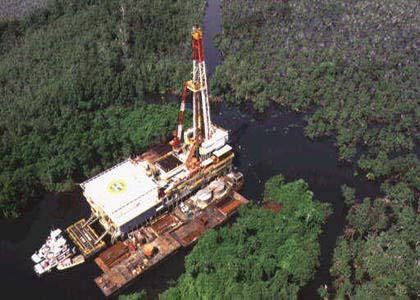07 March 2016, Abuja – At a recent intellectual gathering, the issue of repositioning the oil and gas sector was once again brought to the front burner of discussion writes Ugo Aliogo
 Experts have identified the oil and gas industry as a key driver to economic growth and societal prosperity. They espoused that if the fortunes of the industry is properly utilised in a society centric manner, it has the capacity not just to provide for the future of the nation, but also to improve human capital development and develop infrastructure. As sound and valid as this argument might seem, it does not apply to African countries such as Nigeria where the oil wealth is shared among the ruling elites, with little or nothing for the masses.
Experts have identified the oil and gas industry as a key driver to economic growth and societal prosperity. They espoused that if the fortunes of the industry is properly utilised in a society centric manner, it has the capacity not just to provide for the future of the nation, but also to improve human capital development and develop infrastructure. As sound and valid as this argument might seem, it does not apply to African countries such as Nigeria where the oil wealth is shared among the ruling elites, with little or nothing for the masses.
According to a report by the US Energy Information Administration (EIA), Nigeria is the leading producer in Africa with a proven oil reserves estimated at about 37.2billion barrels as at 2011. Yet the oil revenues are not properly utilised to create other assets with long-lived benefits such as power infrastructure, education sector, human capital, roads and even develop a ‘savings cushion’ for use when oil prices are low.
At a recent lecture organised to mark the maiden edition of Philip Asiodu Lecture series in Lagos, the issue of repositioning the oil and gas sector was the focal point of discourse. Stakeholders suggested how the sector could be repositioned and also how to develop a solid road map for government and policy makers to follow in order to transform the sector to meet with global best practices.
Speaking at the lecture, the Vice-President of World Bank, Ms. Arunma Oteh, said that there were lot of discussions on how to share the oil revenue, instead of how to grow and develop the country amongst the three tiers of government, adding that many state governments have cut down capital spending, while others are struggling to pay salaries and even bail themselves out from debt.
She also noted that with the country’s heavy reliance on the oil industry and national budget’s almost complete dependence on oil revenues, the efficient management and protection of oil resources should not only be a developmental issue but also a national security issue.
“Diversifying Nigeria’s economy away from oil is urgent for two reasons. First, despite Nigeria’s Gross Domestic Product (GDP) growth over the past decade, it lags behind on human development and competitiveness indicators. A broader based, more inclusive economy is needed to effectively transmit as much oil wealth as possible into improving the wellbeing of all Nigerians.
“Second, Nigeria’s over dependence on oil revenues for its economic growth and government budget makes it highly susceptible to oil price volatility. Furthermore, the future of the oil industry will be shaped by climate change and environmental concerns, which require a global transition from fossil fuels to a cleaner, renewable and efficient energy sources.
“The role of oil in accelerating Nigeria’s development is to provide it with financial resources to make strategic investments to diversify its economy. Success requires a strategic vision of the future, establishing sound development plans to achieve that vision, effective implementation, and on-going monitoring of the implementation to ensure that the desired objectives are achieved. Nigeria must establish a strategic vision of what it wants the economy to be in future and continuously re-evaluate that vision in the face of a rapidly evolving world.”
She further explained that the development of the country should imply excellence on fronts that will shape the quality of life and welfare of the people, stressing that despite the high growth of the GDP in the past decade, it still suffers from sustained underdevelopment evidenced by ‘less-than-adequate performance’ in human development and economic indices, “including high income equality, security challenges in the Niger Delta, violence in the parts of the Northeast and mismanagement of public revenues.”
The Declining Oil Price
Oteh explained that the challenges of the oil and gas sector include pro-cyclical fiscal policies, weakening of the agricultural sector, and governance that has been characterised by weak institutions and lack of transparency, adding that the decline in oil prices are being driven by the less demand for energy from China, Brazil, and Europe as a result of weaker economic performance and increase in supply by the key players in the global market.
She stressed that the decline in oil revenue resulting from the oil price decline since mid-2014 has had negative consequence for the distributions to the federal and state government budgets, declining in nominal terms by 39 per cent in the first half of 2015 relative to the same period in 2014. Federal and State governments have dramatically cut spending, and a number of states are struggling just to pay salaries to civil servants and service domestic debt obligations.
“These players have been instrumental in the increasing global oil supply. Observers have indicated that Saudi Arabia, a key member of the Organisation of Petroleum Exporting Countries (OPEC) and a producer of 12 percent of global oil supply, is battling for market share against emerging American shale oil producers who have increased U.S oil production to a 30 year high following the recent removal of 40-year ban on U.S oil exports.
Other OPEC members are essentially maintaining same supply levels while production in Russia and Libya has also increased, and Iran is expected to increase oil supply further as a result of the lifting of sanctions.
“Global supply and demand dynamics determine oil price volatility and directly affects the global economy and in particular economies of major oil importers and exporters such as Nigeria. Global demand for oil increased in 2015, but at a much slower pace than supply. According to US Energy Information Administration (EIA) estimates, global oil surpluses increased by 1.8 million barrels per day (bpd) in 2015, making the second consecutive year of strong inventory build-ups. Persistent oversupply has contributed to oil prices dropping further from January (2016) and reaching the lowest monthly average level (US$31) since the end of 2003,” she added.
Nigeria National Petroleum Corporation (NNPC)
The World Bank VP explained that efforts had been made in the past to introduce comprehensive legislation that would regulate the oil sector and stipulate clear rules on oil revenue management such as establishing a clear legal mechanism governing NNPC revenue withholdings, ‘however such a bill is yet to be enacted’.
She stated that the Petroleum Industry Bill (PIB) met an brick wall in the National Assembly after being presented in 2008. With a modification and re-submission following in 2012, ‘the House of Representatives passed the PIB in June 2015, but the Senate did not follow suit. The current administration has since proposed a 45-page draft Petroleum Industry Governance and Institutional Framework (PIGIF) bill, which focuses on restructuring and corporate governance at the NNPC.
According to her, “For over a decade, NNPC has lacked the capital it needs to meet upstream operating costs. This is in part because there has not been clarity in its funding sources and also because funds have been diverted to other purposes. The corporation has amassed growing, multibillion dollar cash-call debts to joint ventures, many of which it settles years late.
“Its status as a statutory corporation with the large debts and no credit rating means it cannot negotiate much external debt financing on its own. The resulting funding crisis set NNPC on the path of inventing makeshift methods for obligations, both to the JVs and more generally. One of the reasons Nigeria’s oil production has been stagnant at around 2million bpd because of the state’s difficulties in providing share of development and maintenance costs.
“To help the corporation finance its operations and badly needed investments in Nigeria oil infrastructure, NNPC could sell equity, either by divesting physical assets or listing shares on the Nigeria Stock Exchange, to raise capital for important investments. Oil company executives argue that production could almost double if the NNPC were commercialised and the companies freed up to meet the full cost of investment. NNPC needs to transfer much of the financial burden and risk to privately owned companies.
“Listing NNPC on the Nigeria Stock Exchange (NSE) besides growing the Nigeria Capital Market, would also be one important way to strengthen accountability and transparency of managing a state-owned enterprise. This is the same position that I advanced as a Director General of the Securities and Exchange Commission of Nigeria. The reporting requirements ingrained in regulation of listed companies would automatically enhance NNPC’s transparency. It would also allow average Nigerians to participate actively in the wealth-creation and enable easy valuation in the context of ownership of host communities and other stakeholders.
“Partial privatisation would raise money needed for oil infrastructure investments, lower future liabilities, enhance transparency and help optimise NNPC’s structure. Some of these proceeds could also be used to rebuild macroeconomics buffers, depleted by the collapse in oil prices and the failure to have saved more when prices were high. Proceeds of a sale could also be invested in education and infrastructure that would grow and diversify the economy and create jobs in the long-term.”
The Need to Diversify
Oteh said given the country’s reliance on oil, diversifying the economy was necessary, stressing that despite the country’s rapid GDP over the past decade, the country lags behind in human capital development and competitiveness indicators. Therefore a broader-based, more inclusive economy is needed to effectively transmit as much oil wealth as possible into improving the wellbeing of all Nigerians.
“The future of the oil industry will be shaped by climate change and environmental concerns which require a global transition from fossil fuels to cleaner, renewable and more efficient energy source,” she added.
- This Day



